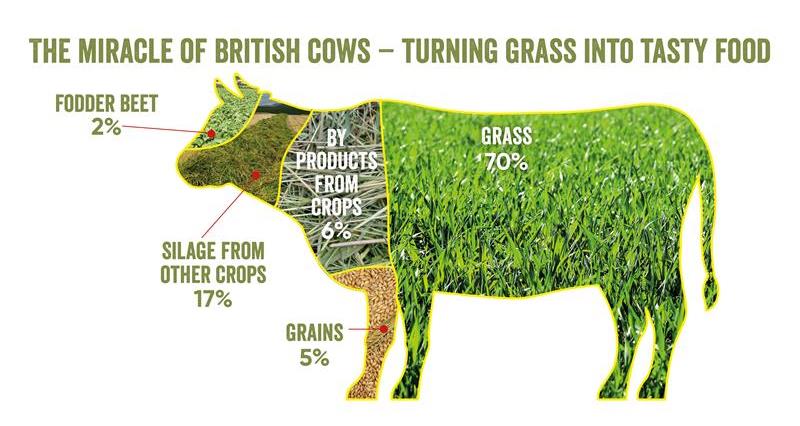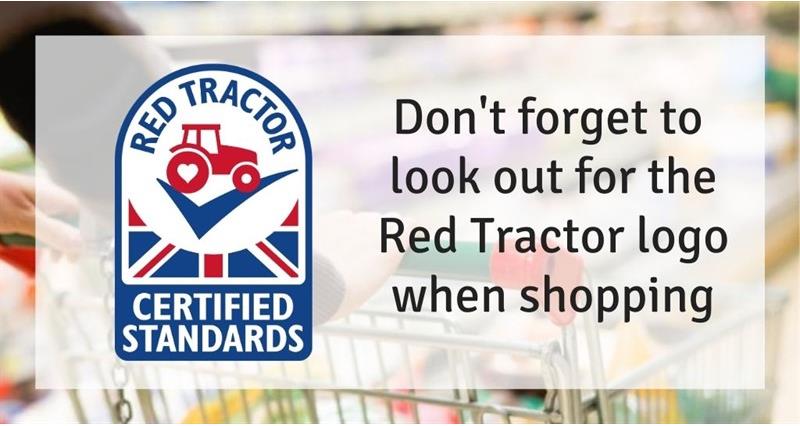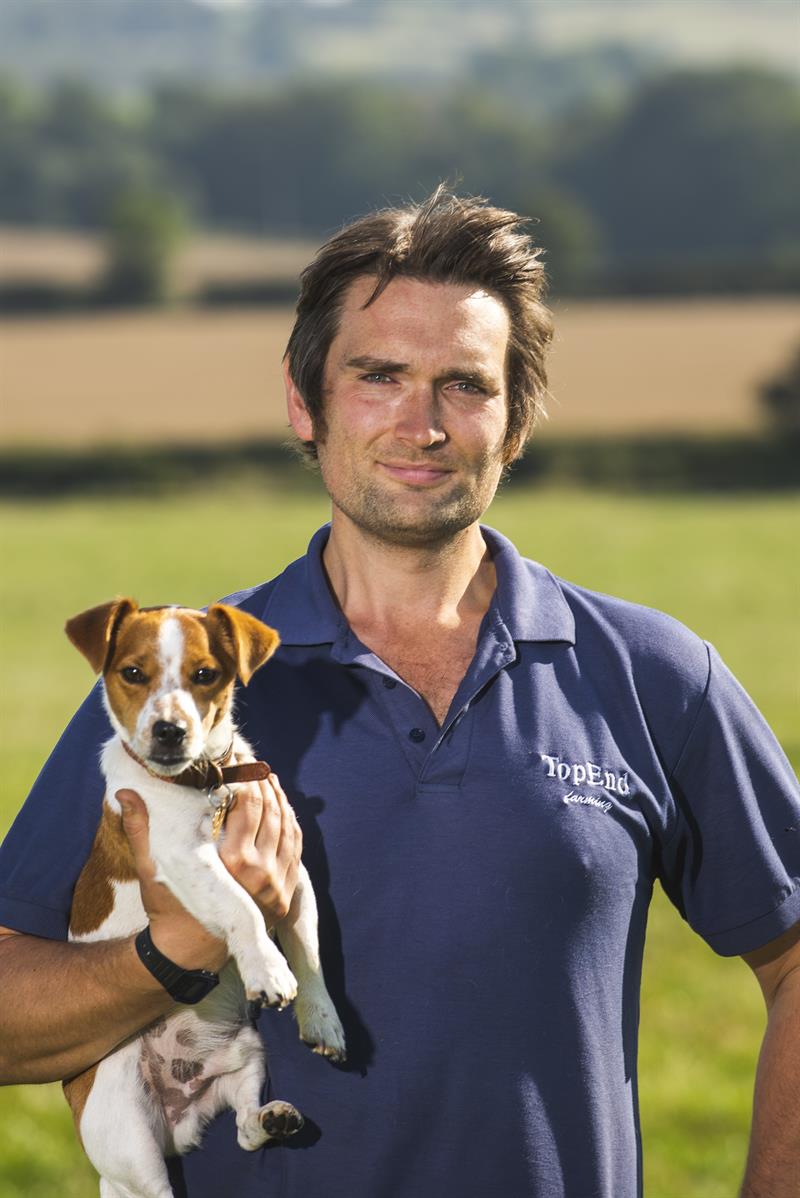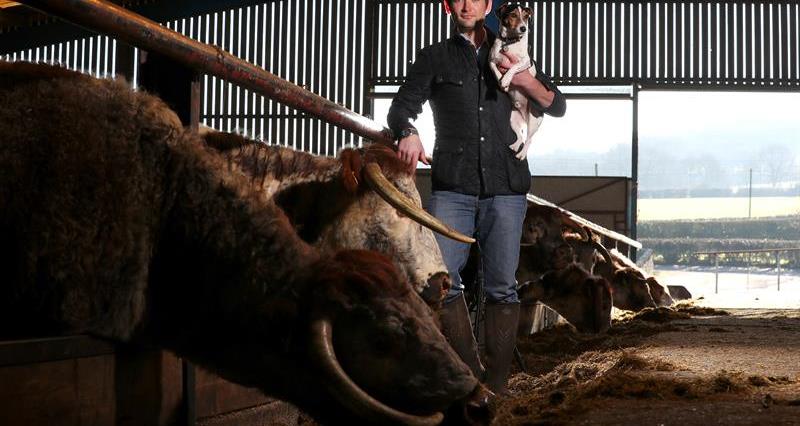British farmer Joe Stanley is proud of the sustainable livestock industry that he is part of. In this article Joe explains why, whether you choose to eat meat or not, farmed livestock are essential to our food system.

Many of you may have watched shows where presenters travel the globe to highlight some of the extremes to which humanity’s desire for ever-cheaper meat has driven the global food supply chain. You may watch these programme with as much a sense of horror as I, seeing pristine rainforest turned to ash in Brazil, or tens of thousands of cattle corralled into barren, shadeless feed-lots and fed grain mixed with antibiotics to boost their growth rates in the USA.
The agricultural practices highlighted in these clips represent some of the most unsustainable in the world. There’s no future for farming conducted in the ashes of our planet, or based on the careless misuse of critical anti-bacterial drugs.
These editorial decisions have evidently been taken to tar all farmers with the same brush, which is most unfair, and a great shame for UK consumers to have missed the opportunity to learn that the meat which they enjoy on their plates is some of the most sustainably produced in the world – with an emission footprint about half the global average.

One of the great attributes of British farming is our preponderance of grass. Broadly speaking, a line can be imagined which bisects the country from north-east to south-west: to the right of this line is the nation’s breadbasket, running from the Humber through the Midlands and down to the south coast. These are our prime arable and horticultural lands, level expanses with deep, rich soils and a pleasant, temperate climate suitable for the growing of crops. To the left of our imaginary line are the grasslands; rolling hills and valleys, the thinner soils of which are bountiful with lush, green grass, regularly watered by the ample rainfall blowing in from the Atlantic.
It’s these grasslands which are the basis of our sustainable livestock industry, and which set us apart from the depictions of global meat production. Fully 65% of the agricultural land of the UK can be farmed with no other crop but grass (which constitutes 70% of our livestock’s national diet): the slopes are too steep; the soils too thin or the rocks too numerous.
Yet this otherwise inedible and unproductive grass is turned, by the magic of ruminant animals such as cattle and sheep, into highly nutritious (and delicious) protein, whether meat or milk. Were livestock not grazing this land, it could not be turned to any other productive use.
Do you want to know more about the British livestock industry and find out why British methods of farming are part of the solution to the climate change challenge?
You might be interested in:
British livestock are part of the solution to climate change
But, don’t livestock emit methane, a potent greenhouse gas? Yes (though primarily from the front end, not the back, as commonly believed!). But although cattle, especially, are emitters of short-lived organic methane (which breaks down over 10-12 years rather than the centuries it takes CO2) the permanent pastures on which they graze absorb CO2 from the atmosphere (much of it from the burning of fossil fuels) and sequester it in the soil. 10 million hectares of UK grassland store approximately 600m tonnes of carbon, and absorb another 2.4m tonnes annually.
This makes agriculture unique among British industry in that it can act as a sink, and not just as a source, for greenhouse gases – it is part of the climate change solution.

In addition, of the remaining 30% of livestock feed which is not grazed grass, much is the otherwise inedible by-products from other crops (on my farm, for example, straw from cereals production), food stuffs such as wonky vegetables rejected for human consumption, or other waste by-products from the human food chain such as brewer’s grains from beer production. Livestock are thus great recyclers and help in reducing food waste.
What’s more, organic livestock manure is absolutely vital to the long-term health and fertility of our soils: without the application of manure to our arable and horticultural fields (whether as muck from housed livestock or from rotational grazing) soils would eventually become exhausted and unproductive. Farmed livestock are, quite simply, essential to our food system, whether you personally choose to eat meat, or not.
Finally, British farmers are proud to have reduced antibiotic use in livestock production by 53% since 2014, and we are one of the lowest users in the world. The ad-lib feeding of antibiotics and use of growth hormones in markets such as the USA is quite simply illegal in the UK – and long may it remain so.
Back British Farming
In short – if you were shocked by what you saw on the BBC back in November; if you are concerned about the climate impact of your dietary choices, I offer you one piece of advice: ensure that you buy British, Red Tractor-assured meat. Take the time to read the label – especially on processed foods such as ready meals or pre-cooked, marinated meats, which are a haven for cheaper, lower quality and less sustainable ingredients.

British agriculture has an ambition to be a ‘net zero’ industry by 2040. This will involve improvements and investment; many things will have to change. But we start in a good place, which is more than can be said for those engaged in razing rainforest to the ground to supply the cheapest meat to the undiscerning shopper. Grazed livestock will be a central pillar of our ability to farm in a carbon-neutral way, and the support of our British consumers will be vital in the growth of this climate-friendly meat.

If you'd like to read more from Joe Stanley, why not join us and read Joe's column, A view from the farm, each month in Countryside magazine.
You'll discover more about your food provenance and how you can support British farming, as well as enjoy a whole host of member benefits and services that will help you make the most of your time in the British countryside.
